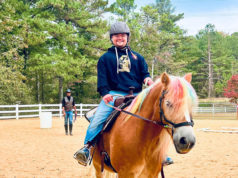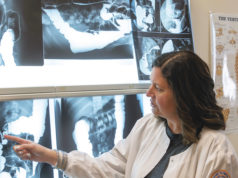By Christy Rosell
Our community spent most of 2020 learning how to live through a pandemic, and a spotlight was cast on nurses and the vital role they play in caring for people during some of their most difficult moments. We’ve heard countless stories of the impact of nurses when the worst happens and our loved ones end up in the hospital — alone — fighting for life.
While quality nursing care was essential to saving lives far before a pandemic struck, the current crisis has highlighted the work of these heroes and brought to light very real challenges they face today.
COVID-19 has further emphasized the ongoing need for compassionate, skilled nurses across our country and in our own community. So how do we ensure quality nursing care for the future?
We had the opportunity to meet virtually with nursing leaders from Chattahoochee Technical College and Wellstar Health System to see how they are meeting today’s healthcare challenges, what they’ve learned from the pandemic, and how they’re preparing nurses to provide quality care long into the future.
Wellstar nurses offer compassionate patient care
“The pandemic has shined a light on this very human, very talented, and very necessary role our nurses play for our patients every single day, not just during a pandemic,” said Jill Case-Wirth, MHA, BSN, RN, senior vice president and chief nursing executive of Wellstar.
Nurses provide care, but more importantly, they provide human compassion and connection, she pointed out. In addition to their vital role in medical care, they take requests for a favorite song, dial a beloved granddaughter, or hold a patient’s hand to offer support.
Case-Wirth shared a story about a patient and his nurse at Wellstar Paulding Hospital. Like many fighting COVID-19, he was struggling to breathe and came to a point where he could no longer continue to do so on his own. His compassionate ICU nurse, Veronica [last name withheld], told him the doctor would come in to discuss intubation, the process when a tube is inserted through the mouth into the airway. Fully covered and practically disguised in PPE from head to toe, the nurse made a promise.
“I told my patient that I’d promise to be by his side and even though he could not see my face because of the PPE, that I was smiling at him,” Veronica recalled. “And through his labored breath, my patient simply said, ‘You are beautiful.’ I said, ‘Hey, how do you know that? You can’t even see me.” And he said, ‘I do see you, I see your heart, and you are my nurse. I’m not afraid.’ And in that moment, that was my ‘why.’”
The patient fought for his life, and ultimately survived COVID-19. Later, he reached out to commend Veronica for the comfort she provided during what he called the toughest moment of his life. “During this pandemic, when loved ones have sometimes had to settle for the safety of Facetime chats instead of in-person visits, our nurses have been a constant, reassuring presence,” Case-Wirth said.
Mitigating burdens and supporting resiliency
Unfortunately, while some nurses have found their “why” — their purpose — validated during this time, countless others have experienced burnout, including physical and emotional exhaustion; decreased job fulfillment; movement away from bedside roles; and even abandonment of the profession. Nurses are people caring for people, so providing care for the caregivers is a priority for Wellstar.
“The pandemic has placed additional professional and personal burdens on nurses as they strive to meet complex clinical and emotional needs, providing compassion and companionship in the absence of family,” Case-Wirth said. “Many nurses find themselves giving everything they have to help patients, often denying self-care.”
She said Wellstar implemented proactive approaches to address the stress, anxiety, and potential for burnout among its 7,000 nurses early in April. Resources included ways to mitigate burnout, such as “respite shifts” where nurses could work on non-COVID floors, resources to improve their quality of life, and peer support groups.
Quality care process changes inspired by the pandemic
Wellstar team members, including nurses and nursing partners at every level, are empowered to identify opportunities and procedures to be more efficient and effective. Case-Wirth explained this helps impact the future of quality care at Wellstar hospitals. One example of how a nurse can make a big impact comes out of Wellstar Cobb Hospital. According to Case-Wirth, an ICU nurse named Rosmery [last name withheld] led the way to put into practice an evidence-based manual on prone process for critically-ill patients with COVID-19. “This process has proven to be crucial for patient recovery and was implemented throughout our system,” Case-Wirth said.
Another Wellstar initiative to improve patient outcomes is a new virtual nurse program. Highly trained rapid response nurses are paired with primary care nurses who monitor patient conditions, vital signs, and symptoms at patients’ bedsides.
New nurse education
Finally, while this article has focused primarily on how Wellstar is improving quality in the wake of the pandemic, Wellstar has long-focused on education and onboarding new nurses. The health system plays a key partnership role with Georgia-based schools of nursing, including Kennesaw State University Wellstar School of Nursing, Mercer University’s Georgia Baptist College of Nursing, and the Wellstar Nursing Career Pathway Program for high school students. In these relationships, the health system provides faculty and clinical learning sites. Wellstar also offers a 12-month Graduate Residency Program that nurtures new nurses transitioning into practice during their first year and includes professional enrichment classes as well as acute, critical, and specialty training.
Wellstar also partnered with Chattahoochee Technical College to institute a certified nursing assistant training program for existing team members who want to become dedicated caregivers and fill critical nursing support roles. The program introduces students to the role and responsibilities of the nursing aide, provides training required to serve as a certified nursing assistant, and enables Wellstar employees to pass their Georgia certification examination.
“We’re leading the charge to prepare nurses for long-lasting careers and making sure that nurses — past, present, and future — know that Wellstar values the vital role they play in providing compassionate care,” Case-Wirth said.
Chattahoochee Tech prepares nurses for the future, creatively
“Our community wants to help our nation become healthier and deal with this pandemic,” said Dr. Quetina Pittman-Howell, Ph.D., RN.
As the dean of Nursing at Chattahoochee Tech, Pittman-Howell saw applications for the nursing programs increase, even as new challenges present themselves for students and faculty.
“In March, we got the email that we were going online 100 percent and at the same time, our partners said they were pulling all students out of the clinical setting,” Dr. Pittman-Howell said. “We’re the pipeline to practice. If we can’t get students out on time, this limits the number of qualified nurses we can provide our partners. It was very important for the faculty to work together to meet requirements for the accrediting body so our students could get clinical hours.”
Nursing excellence goes online
Simulations — along with real-world clinical practice — help develop nursing judgement, a combination of concepts including critical thinking, evidence-based practice, and clinical decision making. To continue preparing students to provide excellent nursing care, it was critical to take these traditionally in-person methods online. “Nursing judgement is one of the most important parts to prepare that student to manage patient care,” Dr. Pittman-Howell said. “When you think of nursing, it is an application practice. In nursing education, it is our responsibility to allow students to touch, feel, and do. It’s like developing a muscle.”
After going virtual, nursing program faculty collaborated daily, creating critical opportunities for students to practice nursing judgement in nontraditional ways. Tech-savvy instructors translated their popular scramble classroom model to virtual, providing a mix of lecture and interactive learning. And, clinical rotations went online. “The faculty became the patients,” she remembered. “Students would log in and ‘care’ for us.”
Thankfully, she said students are now back in clinical settings, gaining valuable bedside experience.
Teaching nurses to care for themselves
The nursing program has an advisory board made up of nurses and community members who discuss the realities of the clinical settings to better impact students. And, like many members of the faculty, Dr. Pittman-Howell is a practicing nurse. She noted that resilience is a topic they have discussed more often since the beginning of the pandemic. “Nurses are getting worn down,” she said. “We need to maintain the number of nurses at the bedside.”
As a result, the faculty has begun to infuse resiliency into courses, covering topics such as coping with emotional family members who can’t see patients because of COVID-related visiting restrictions; recognizing feelings of burnout and stress that come with additional donning and doffing of protective equipment throughout the day; and the importance of self-care.
“We have to be focused as a profession on taking care of ourselves,” she said, noting that nursing school stress is good practice for the future.
Faculty encourage students to plan blocks of time for themselves and take a breather, whether it’s through meditation, getting a manicure, or working on a project. “We must take care of ourselves to make sure every patient is cared for with integrity and decency and honor,” Dr. Pittman-Howell said.
Nursing growth
Celebrating her tenth year at the technical college, Dr. Pittman-Howell reflected on the program’s growth. A decade ago, she was a professor in the yet-to-be-accredited program; there were just 18 students. “I had the opportunity to work with great faculty and we built it into a very competitive program,” she said.
In 2020, Chattahoochee Tech’s RN program was ranked third in the state by RegisteredNursing.org and there were 416 applications for just 40 seats. “The caliber of our program puts our students at a huge advantage,” she said. “You can be an effective nurse when you go to a technical college.”




